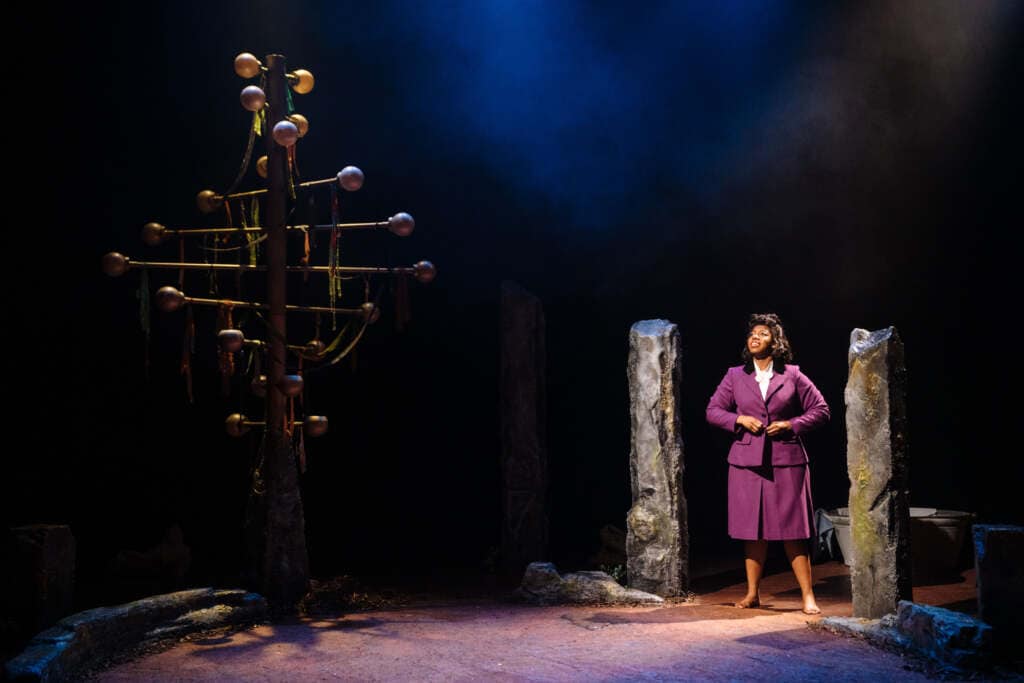
🎭 Family Tree
📍 Brixton House Theatre
🎫 Gifted
⭐⭐⭐
Mojisola Adebayo’s play, ‘Family Tree’, brings to light a dark history of the scientific world.
Directed by Matthew Xia, the powerful drama is told through a blend of spoken word, interpretive dance and harrowing historical truths about race, health, the environment and the forgotten legacy of Henrietta Lacks – a Black woman whose influence on modern-day medicine is extraordinary.
The story
The story is inspired by Henrietta Lacks, an African American woman who died in 1950s Maryland from cervical cancer. Before she passed, doctors took samples from Lacks’ biopsy during the treatment, sharing them with researchers who discovered her cells had the capacity to survive and reproduce. This created the HeLa cell line, which was (and still is) involved in medical research in cancer, immunisations, HIV and most recently, vaccines against COVID-19. Despite saving thousands of lives, Henrietta did not have any knowledge or consent over the actions, nor did her family years after her death.
‘Family Tree’ is a thought-provoking play that unpacks the injustices Black women faced in medical care over the years. Adebayo’s intertwines historical stories of enslaved women in America, subject to cruel experiments by white medical staff. We also see a trio of Black women play present-day NHS nurses, passionately discussing racism in healthcare, among professionals and patients, ‘WHY’ people and the Black Lives Matter movement.
My thoughts
Aminata Francis plays Henrietta Lacks, opening the show with a powerful, rhythmic monologue as an immortalised being. Francis’ presence is captivating; I admired their strong storytelling as they glided barefoot across the stage, delivering Adebayo’s poetic script with deep emotion.

Mofetoluwa Akande, Keziah Joseph, and Aimée Powell play the trio of women, and were strong in their individual roles, seamlessly transitioning between the contrasting characters. I also loved how they tended to one another’s hair during their scenes as NHS nurses. Throughout the show, a smoking cowboy (Alistar Hall) sinisterly walks across Simon Kenny’s set, presumably embodying a version of the ‘Marlboro man’ and also death.
As we weave between the different generations, I admittedly struggled to find the plot. The play could have benefitted from a longer run time as there was a lot of information packed into this 90-minute piece. The poetry and prose were beautiful, but the scenes swiftly moved on to the next. I wished there was time for Adebayo’s writing to linger and let us reflect. This was expedited during the final scenes with the appearance of Oshun, the Yoruba goddess of water, fertility and love. Whilst Akande’s performance in this role was enjoyable, it felt out of place and almost rushed as the play was nearing the end.

‘Family Tree’ is both an important exploration and celebration of Black women’s contributions to healthcare and their undeniable strengths. The uncomfortable truths of racial inequalities over the years are revealed. From a personal viewpoint – I’m a Black woman living in the U.K., where these inequalities are still occurring, so parts of the show were difficult to hear. Nonetheless, I commend Mojisola Adebayo and Matthew Xia for creating a play that doesn’t shy away from revealing the harrowing, untold experiences of Black women as well as shedding light on Henrietta Lacks’ story.
I thoroughly enjoyed Diane Alison Mitchell’s movement direction, as the cast danced together in sync to an African drum beat. The joyous ending serves as a celebration of Henrietta Lacks’ legacy and generations of Black women.
Family Tree is playing at Brixton House Theatre until 23 April, before continuing its U.K. tour.



